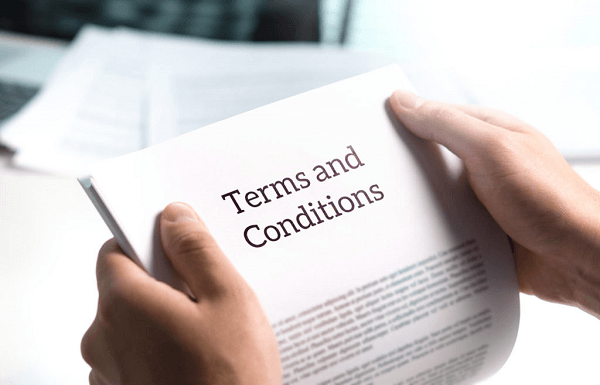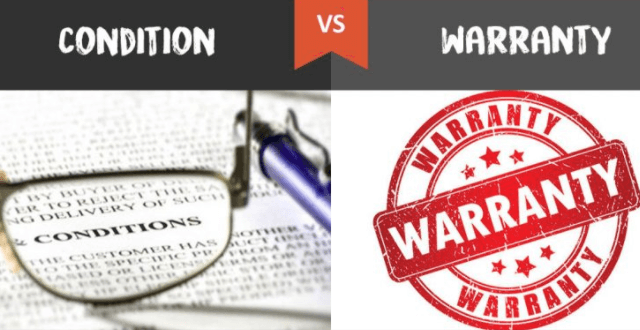Difference between Condition and WarrantyWhen we buy a product or service, it is important to understand the terms and conditions that come with it. Two common terms often used in this context are "condition" and "warranty". When entering a contract, it is necessary to contemplate the difference between conditions and warranties. If you are the buyer, you should negotiate for important conditions, such as the condition that the goods must be of a certain quality. If you are the seller, you should limit the conditions in the contract to minimize your risk of breach. Similarly, specify the warranties you are willing to make and exclude any warranties you are not willing to make. Despite being used relatively interchangeably in a similar field, there are significant differences between them. Let us understand in detail: What is a Condition?A condition is the cornerstone of the entire contract and essential to carry it out by the framework of the Sale of Goods Act 1930. If the terms are violated, the offended party may treat the agreement as terminated. In other words, the buyer can revoke the contract or refuse to take the items if the seller doesn't comply with a requirement mentioned as part of the conditions. If the customer has already paid, he is entitled to a price refund and compensation for the contract's breach. A condition refers to a fundamental aspect or feature of a product or service that acts as a necessity to function as intended. In other words, a condition is necessary for the product or service to be considered fit for its intended purpose. For example, if you are buying a car, the condition of the sale might be that the car has a working engine and functioning brakes. If these conditions are not met, the product is considered defective, and the consumer is entitled to a refund or replacement. A condition is a vital component of the contract and goes to the root of the contract. The breach of a condition is considered a serious matter and gives the non-breaching party the right to terminate the contract, seek damages, or both. A condition can be expressly stated in the contract or implied by law. The most common example of an implied condition is the condition of merchantability and fitness for a particular purpose in the sale of goods. For instance, suppose you are buying a car from a dealership, and the salesperson guarantees the car has not been in an accident. If it turns out that the car was indeed in an accident, you have the right to terminate the contract and claim damages because the condition of the car not being in an accident was essential to the agreement between the parties. 
Types of ConditionWhile considering the context of a contract of sale, there are basically two notable condition types, namely:
What is a Warranty?On the other hand, the additional clause and written assurance that is collateral to the contract's primary goal is known as a warranty. The result of a warranty breach is that the wronged party cannot reject the entire contract but may seek damages instead. In simple terms, a warranty is a promise made by the seller or manufacturer of a product or service that it will meet certain standards of quality or performance for a specified period. A warranty is a contractual agreement between the seller and the buyer that the product or service will function as intended during the specified period. For example, if you buy a phone with a one-year warranty, the manufacturer guarantees that the phone will be free of defects and perform as advertised for one year from the date of purchase. If the phone fails to meet this standard during the warranty period, the manufacturer will repair or replace it without charging any fee. A warranty is part of an agreement that gives a secondary or collateral obligation. Unlike a condition, the breach of a warranty is not considered a fundamental breach of the contract. A breach of warranty entitles the non-breaching party to claim damages, but it does not give them the authority to cancel the contract. For example, suppose you buy a washing machine from an appliance store, and the store promises that the machine will work for five years. If the machine stops working after two years, you can claim damages for the cost of repairs or replacement, but you cannot terminate the contract because the warranty is not an essential term of the agreement. 
Types of Warranty
Condition Vs. WarrantyIt is also important to note that conditions and warranties are subject to different legal requirements and limitations. For example, in some jurisdictions, implied warranties cannot be disclaimed or waived, while express warranties may be subject to strict requirements for notice and disclosure. In addition, the duration and scope of a warranty may vary depending on the product or service, the seller or manufacturer, and the applicable laws and regulations. Consumers should also be aware of their rights and remedies under the law if they breach conditions or warranties. Depending on the circumstances, a consumer may be entitled to a refund, replacement, repair, or compensation for damages caused by a defective product or service. In some cases, consumers may also be able to pursue legal action against the seller or manufacturer for breach of contract or consumer protection violations. Finally, it is worth noting that conditions and warranties are not the only factors to consider when purchasing. When evaluating different products or services, consumers should also consider other factors such as price, quality, features, reputation, and customer service. By doing so, consumers can make informed decisions that meet their needs and expectations while minimizing the risk of problems or disputes down the line. 
The legal difference between a condition and a warranty is an essential concept in contract law that can have significant implications for the parties involved. A condition is a term in a contract that is essential to the contract's performance, while a warranty is a term that is not essential to the contract's performance. The distinction between conditions and warranties is critical because it determines the rights and obligations of the parties in the event of a breach of contract. Conditions and warranties are two types of contractual terms with distinct legal consequences. A condition is a term in a contract that is so essential to the contract's performance that its breach entitles the innocent party to terminate the contract and seek damages. Conditions are typically identified by the use of phrases such as "if", "provided that", or "on condition that". For example, a contract for the sale of a car may include a condition that the car must be in good working order at the time of delivery. If the car is not in good working order, the buyer may be entitled to terminate the contract and seek damages. In contrast, a warranty is a term in a contract that is not essential to the contract's performance. A breach of warranty does not entitle the innocent party to terminate the contract but may entitle them to seek damages. Warranties are typically identified by the use of phrases such as "warrant", "guarantee", "assurance", or "promise". One of the key differences between a condition and a warranty is the nature of the obligation. A condition is an essential contract term, while a warranty is a secondary or collateral obligation. This means that a breach of a condition entitles the non-breaching party to terminate the contract, while a breach of a warranty only entitles them to claim damages. Another difference between the two is the remedies available to the non-breaching party. The non-breaching party can terminate the contract and claim damages if a condition is breached. On the other hand, if a warranty is breached, the non-breaching party can only claim damages. A breach of a condition has a significant impact on the contract. If a condition is breached, the innocent party can treat the contract as terminated, meaning they can refuse to perform their obligations under the contract and claim damages for any loss suffered due to the breach. However, if a warranty is breached, the innocent party can only claim damages for any loss due to the breach, but they cannot terminate the contract. Conditions are often implied by law, while warranties are usually expressly stated in the contract. For example, the condition of merchantability and fitness for a particular purpose in the sale of goods is implied by law. At the same time, the warranty that a product will be free from defects is usually expressly stated in the contract by the manufacturers or sellers. Conditions are considered more important than warranties, and courts often interpret contracts as prioritizing conditions over warranties. If a contract contains both a condition and a warranty, the condition shall take precedence in the event of a dispute. In the following table, we will discuss the notable differences between a condition and a warranty and the implications of this difference for the parties involved in a contract.
ConclusionUnderstanding the difference between a condition and a warranty is crucial when purchasing goods or services. A condition refers to a fundamental aspect or characteristic of a product or service that is required to function as intended. At the same time, a warranty is a promise made by the seller or manufacturer that the product or service will meet certain standards of quality or performance for a specified period. By availing of a warranty and thoroughly reading the terms and conditions of the product or the service, consumers can protect themselves from defective products and ensure they receive the quality and performance they expect from their purchases.
Next TopicDifference between
|
 For Videos Join Our Youtube Channel: Join Now
For Videos Join Our Youtube Channel: Join Now
Feedback
- Send your Feedback to [email protected]
Help Others, Please Share









